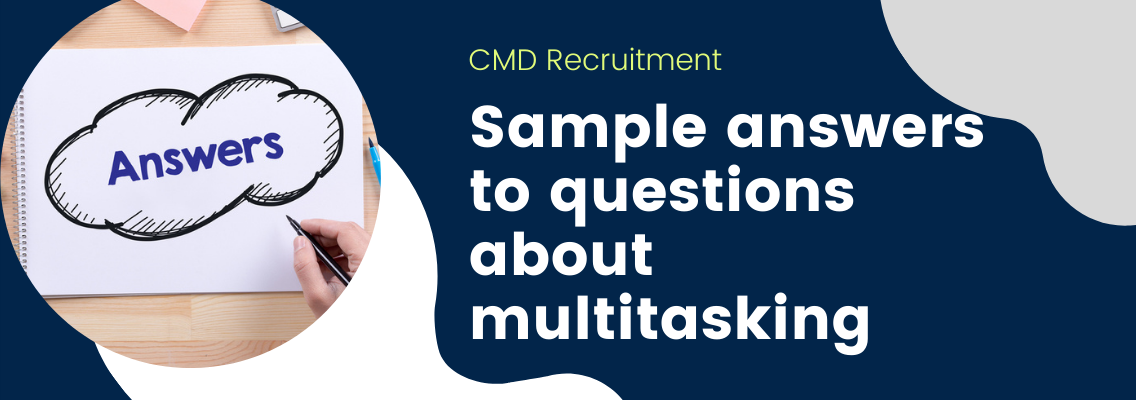Important notice - We are aware of a scam where people are impersonating CMD Recruitment to offer jobs via WhatsApp & Telegram. This is a scam, CMD Recruitment will never contact new candidates via these methods. Any legitmate offer from CMD Recruitment would be made via a telephone call.

September 3, 2021
The ability to multitask is increasingly in high demand. As a result, employers will often ask questions that explore your understanding of multitasking and how you manage to multitask in your life and your work.
The question might not be as direct as “can you multitask?” so you need to be able to look for the clues of what the interviewer really wants to know. Any mention of managing a hectic workload, prioritising demands and jumping from one task to another should be interpreted as questions about multitasking.
Most jobs require some level of multitasking, so it’s worth thinking about how you would answer these types of questions before your interview.
If you are interviewing for a fast-paced role will lots of conflicting demands, employers want to know that you’ll be able to keep up with demands? You might have phone calls, emails and conflicting projects to juggle. If you can’t switch from one task to another smoothly, you might struggle to do your job.
Some people like to focus on one task until it is completed. If they switch mid-way through a task, they might make mistakes. And if they struggle to switch from one task to the next, it might take them much longer to complete their work. This isn’t a problem in some roles, but it can be a barrier to employment in others.
Employers know that multitasking isn’t the most efficient way to work, but they simply want to know that if you were to be pulled from one task and put on another, would this completely detail your day?
You should always have an answer prepared for when you are asked about your ability to multitask. Think about examples of situations in your personal or professional life that demonstrate your ability to switch between tasks.
You must show the interviewer that, despite the demands on your time, you know how to manage them in a way that works best for you. Think of a few examples of times when you managed several tasks at once. Make sure you pick examples that are most relevant to the role you are applying for. This lets the interviewer know that you understand the demands of the role you are applying for.

If you’re struggling to answer this type of interview question, consider the following sample answers.
“I find multitasking helps to keep me interested and motivated. I like switching between tasks as it gives me an opportunity to test my attention to detail and my skills in time management.”
Why this answer works: This answer tells the interviewer that you are comfortable jumping between tasks and don’t feel stressed out by the idea of a fast-paced role. If they are looking for someone who can hit the ground running in the role, this answer will show that you are an excellent fit.
“I like to be busy all the time, and this helps me to get more done. I like to batch tasks together so I’m working on similar tasks and this helps me to get more done in less time. Given a choice, I don’t think I would want to focus on one task at a time as this doesn’t appeal to my style of working.”
Why this answer works: You’re telling the interviewer that you prefer multitasking but that you also know how to do it efficiently. Employers know that switching between tasks can be a drain on resources, particularly for those who don’t like multitasking. So by pointing out methods you use to make it more effective, you’ll give them confidence you can manage the role.
“In an ideal world, I would give every task my full attention and complete it before moving on to the next. However, I know that things rarely work out like this in a demanding office environment. So I’ve developed systems to help me manage my time and my focus any time the tasks start piling up. I create a priority list and try to stick to this as much as possible.”
Why this answer works: You acknowledge that you’d rather not multitask but then outline how you make it work for you. This answer is ideal if you know that multitasking isn’t a huge part of the role. It shows that you are able to adapt to the demands of a busy work environment but are also very skilled at getting on with the task at hand.
The best answer to this question will always depend on the role you are applying for. If multitasking and jumping between tasks are more common in your industry, you need to demonstrate how you optimise your schedule while keeping on top of the biggest priority tasks.
And if multitasking is less common in your role, you need to let the interviewer know how you could handle this if the situation ever arose.

You should never lie or stretch the truth in an interview. It’s absolutely fine to have weaknesses and blind spots, but don’t gloss over these with lies. If you aren’t very confident at multitasking, let them know the steps you are taking to improve. If you do lie, it won’t take long for the truth to come out once you start your job.
And if you absolutely hate multitasking but you know it’s essential for the role, you might want to reconsider if you’re in the right role. Lying to get a job that you aren’t right for could lead to employment problems further down the road if you have to explain why you didn’t stay in a role for very long.
Try to keep it all in perspective. This is just one part of the role and one part of the interviews. As long as you have a few situational answers in mind, you should have no trouble satisfying the interviewers.
Back to Blog